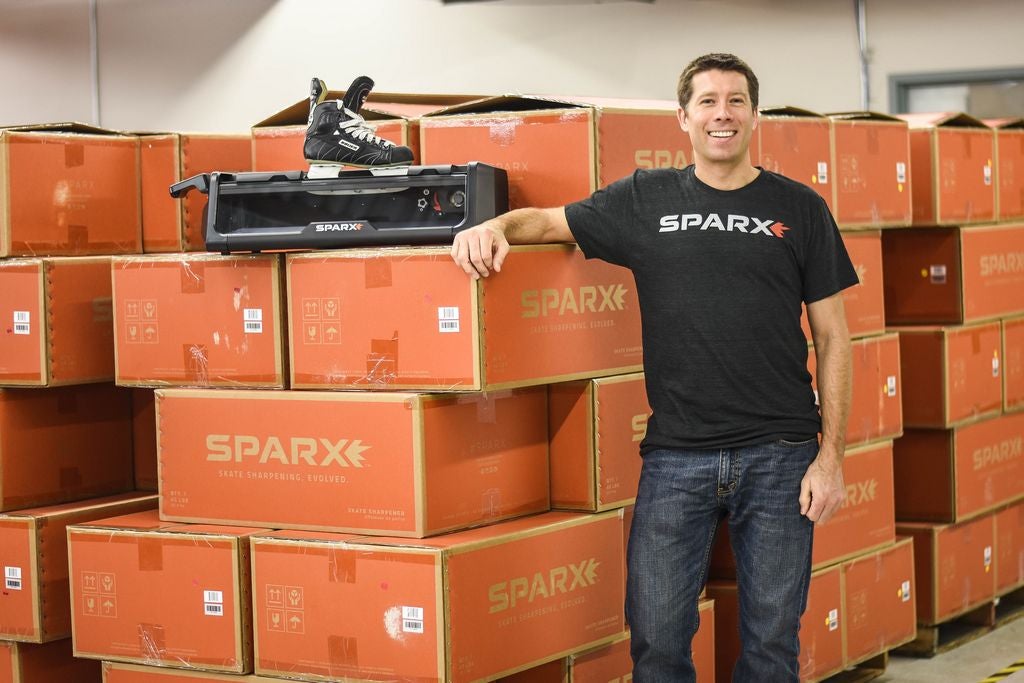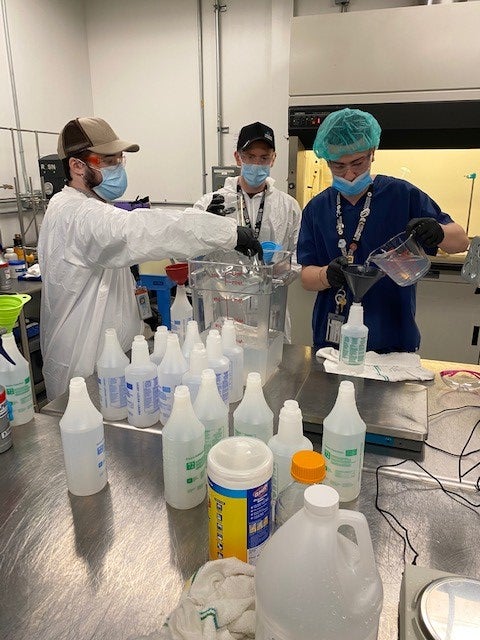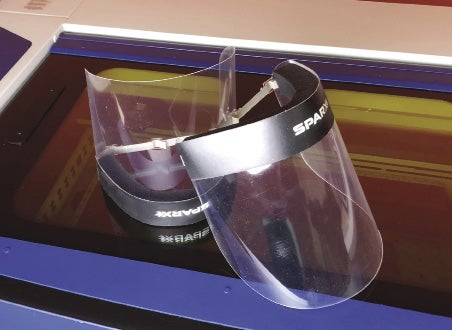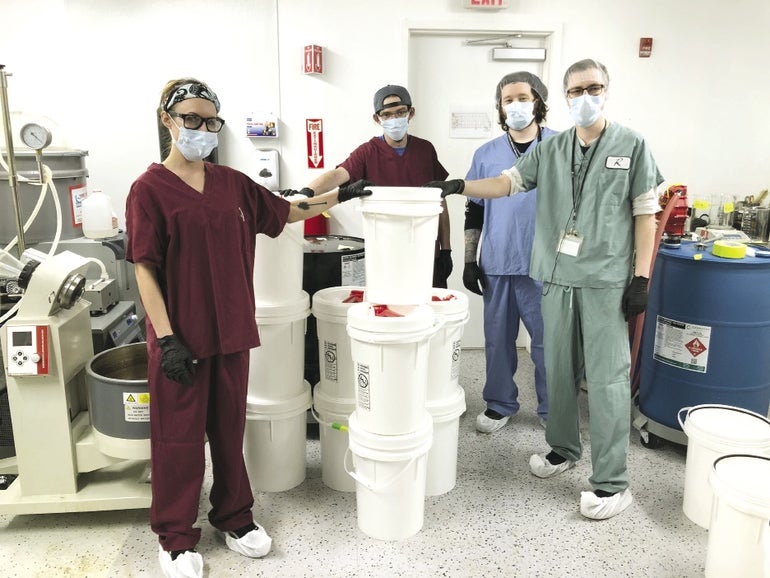The Gov. Charlie Baker Administration has leaned on the state’s manufacturers, creating the Manufacturing Emergency Response Team under the Massachusetts Technology Collaborative to coordinate manufacturers’ move toward pandemic-related materials.
Get Instant Access to This Article
Subscribe to Worcester Business Journal and get immediate access to all of our subscriber-only content and much more.
- Critical Central Massachusetts business news updated daily.
- Immediate access to all subscriber-only content on our website.
- Bi-weekly print or digital editions of our award-winning publication.
- Special bonus issues like the WBJ Book of Lists.
- Exclusive ticket prize draws for our in-person events.
Click here to purchase a paywall bypass link for this article.
For more than half a century, the Spencer manufacturer FLEXcon has been focused on making films and adhesives whose origins consumers might not think too much about. These days, the company is working on cranking out something it’s never made before: Face shields for hospital workers.
Within 36 hours being contacted by area hospitals looking for help, FLEXcon CEO Lavon Winkler said, the company was already producing the first masks of what it expects will eventually number in the millions.

“We had a team of people who got in a room and started brainstorming,” Winkler said. “We had never made a face shield.”
FLEXcon isn’t alone among Central Massachusetts manufacturers and other companies quickly pivoting from making their usual products to making masks and hand sanitizer to aid in the fight against the coronavirus pandemic.
The Gov. Charlie Baker Administration has leaned on the state’s manufacturers, creating the Manufacturing Emergency Response Team under the Massachusetts Technology Collaborative to coordinate manufacturers’ move toward pandemic-related materials.
The effort has been broad.
In Fitchburg, cannabis producers Revolutionary Clinics and Garden Remedies have both quickly gone from growing and producing cannabis products to making hundreds of gallons of sanitizer. Nashoba Valley Spirits in Bolton is cranking out sanitizer, too – enough in one week, the company said, for 1 million hand washes.
Sparx Hockey in Acton, which normally makes ice-skate-sharpening equipment, quickly found the material and know-how to make masks. And a similar effort is taking place at Worcester’s Technocopia, a makerspace for startups whose facility is closed but whose members are pitching in from home.
Learning a new craft

For Russ Layton, the founder of Sparx, making plastic face shields didn’t come naturally. Layton grew up playing hockey and parlayed his passion for the sport and talent for engineering and entrepreneurship into a company on Inc. 5000’s list of the fastest growing private companies, last year landing at 56th in America.
Sparx has had a lot of limitations. Little of the company’s equipment was made for masks. It couldn’t secure enough foam and didn’t have a blueprint for how to manufacture a mask.
But Sparx has lasers for cutting metal, which it has used to cut acrylic to make buckles. A friend of Layton’s in Maine knew a local maker of foam, connecting the two to give Sparx another needed component for masks. And Bauer Hockey, a New Hampshire company that’s normally a competitor, shared publicly the instructions for making masks.
“Everyone is sharing their specifications and their supply chains,” Layton said, contrasting today’s way of operating to the more guarded way of normally doing business. “What’s different is that demand is so high that not a single one of us could possibly meet it.”
In a labor intensive process, Sparx has been able to make 10,000 shields a week and is working on making headwear for coronavirus patients who are receiving help breathing through a tube to better protect their caregivers.
“It’s incredibly manual,” Layton said of the process. “No automation. And everyone has to be six feet apart with masks on.”

Revolutionary Clinics and Garden Remedies each had an easier time switching to making sanitizer. They both already had ethanol for making cannabis oil products, as well as the right certified equipment for working with the potentially combustive material.
The companies just needed to get a few World Health Organization-certified ingredients – mainly alcohol, glycerin and aloe – and they were able to start producing in a few days. Both have produced hundreds of gallons of sanitizer each week donated to area hospitals and other health facilities.
“They responded quickly,” Jim Comber, Garden Remedies’ director of marketing, said of his staff. “The spirit in that building is just tremendous.”
Manufacturers who have made the switch plan to keep going as long as their help is needed. In some cases, once they get the hang of making their new products, they expect to get far more done.
FLEXcon, for example, hopes to make 40,000 masks a week by the second full week of April. By May, it’s aiming for 1 million a month.
Proud to join the fight
Some manufacturers, including Sparx, would be temporarily closed if not for making such necessary products. Nashoba Valley Spirits remained partly open because it includes a farm as well as a retail business offering deliveries. The cannabis producers were able to stay open because their businesses include medicinal sales, which are considered essential.

“We as a company were really excited to be able to contribute,” said Keith Cooper, Revolutionary Clinics’ CEO.
Besides for keeping the lights on, making masks and sanitizer has given manufacturers a role in combating a pandemic expected to kill at least 100,000 in the United States alone.
Among those pitching in however they can are the nearly 100 members of the Worcester makerspace Technocopia. Though its 11,000-square-foot space in the Printers Building downtown is closed, Technocopia was able to create with 3D printers some materials to get started before the closure, and some of its members are now making masks from home.
Technocopia is working with international manufacturer Saint-Gobain, the Worcester Center for Crafts, Ferromorphics Blacksmithing of Worcester and Cotyledon Farm of Leicester to help make shields, said Lauren Monroe, Technocopia’s co-executive director.
The effort – which includes a Facebook page, the Worcester Face Shield Project, to solicit help or materials – has been grassroots, with a lot of out-of-stock and other roadblocks.
“It has felt like it’s one individual talking to another individual, who’s talking to another individual, who is getting you what you need,” Monroe said.
A sense of pride has accompanied the manufacturers’ work, even if it’s largely forgotten about during the rush.
“We haven’t spent a whole lot of time talking about it because we’re working so diligently,” Winkler, the FLEXcon CEO, said.
At Nashoba Valley Distillery, the staff was able to celebrate when, after a seven-day work week they made 275 gallons of sanitizer.
“It was our goal for a while, and we finally hit it,” said Justin Pelletier, the company’s COO. “So that was a big deal for us.”

